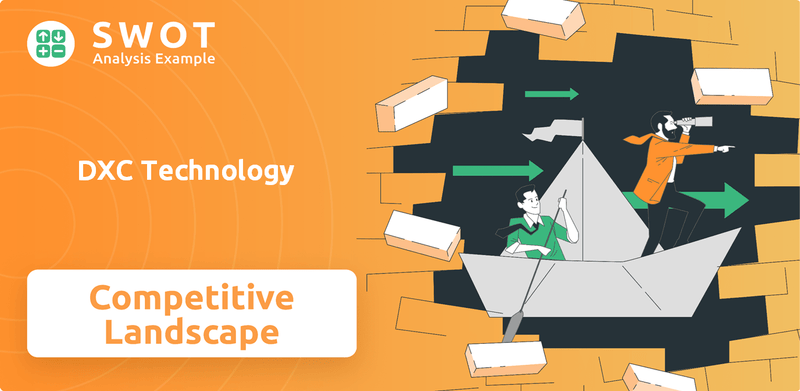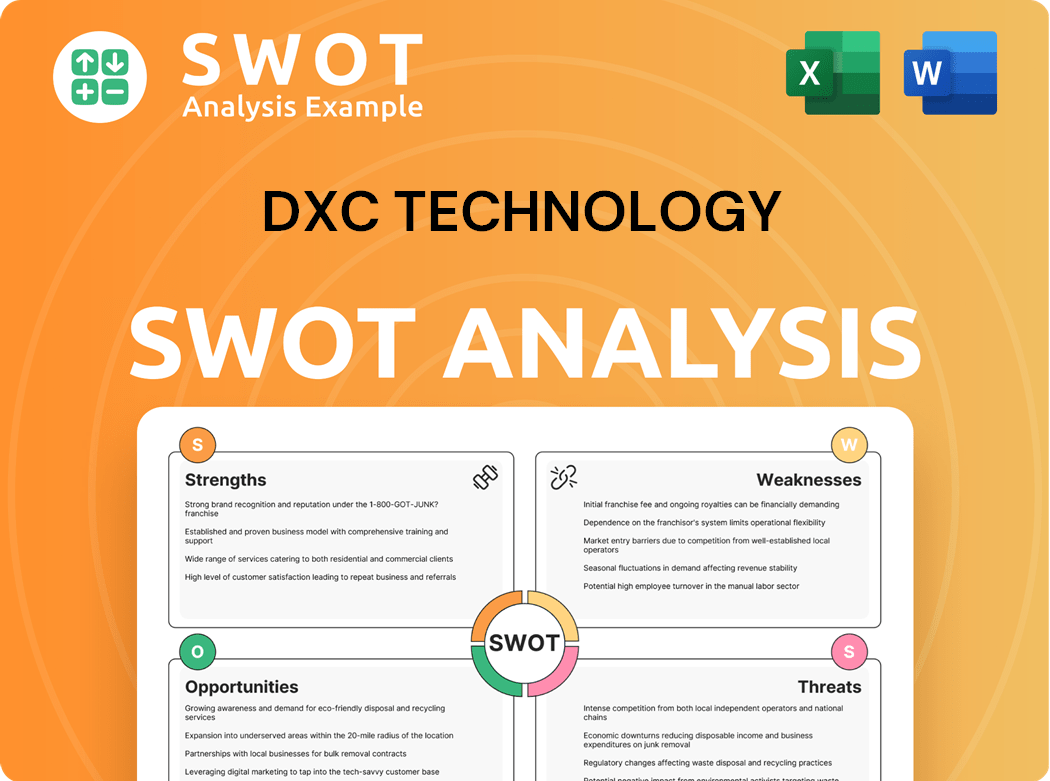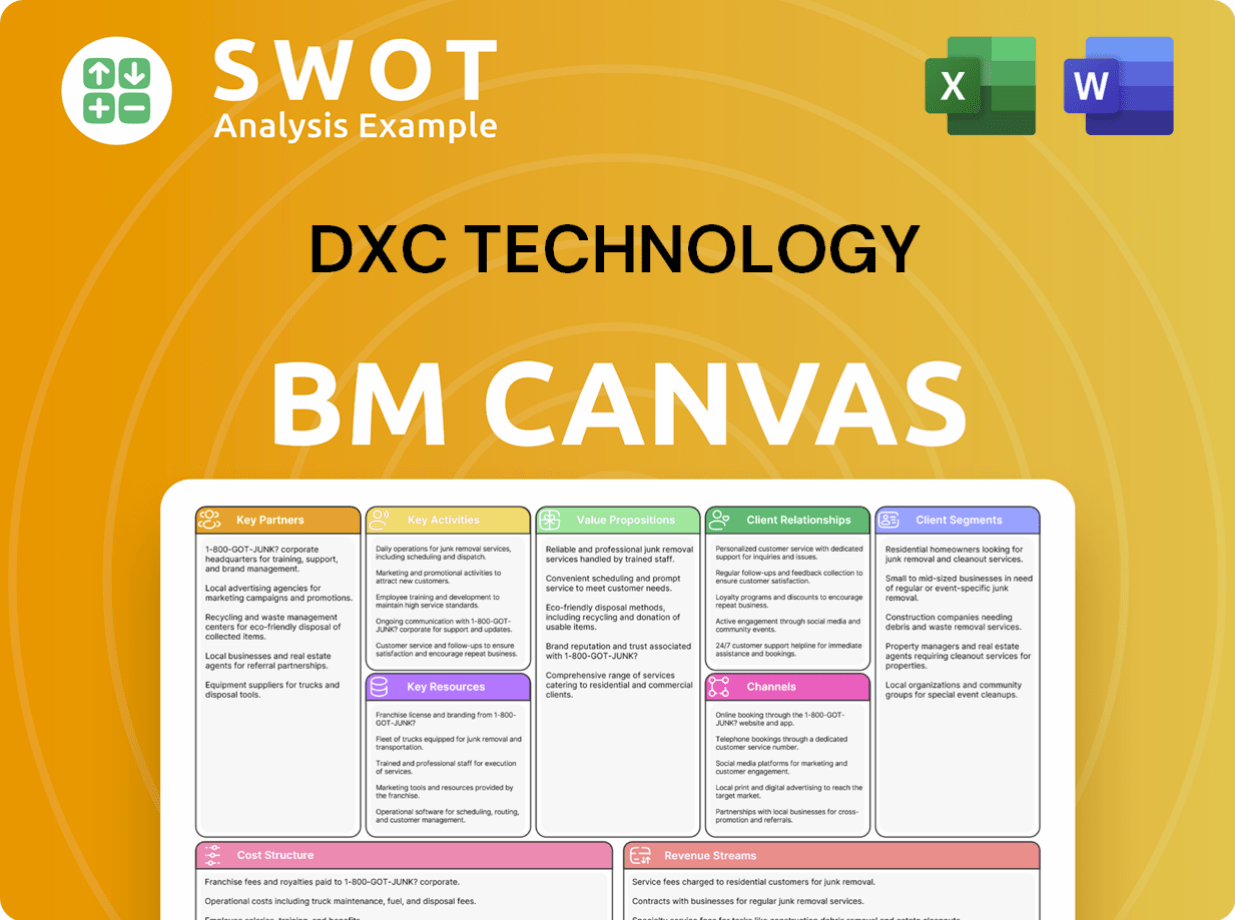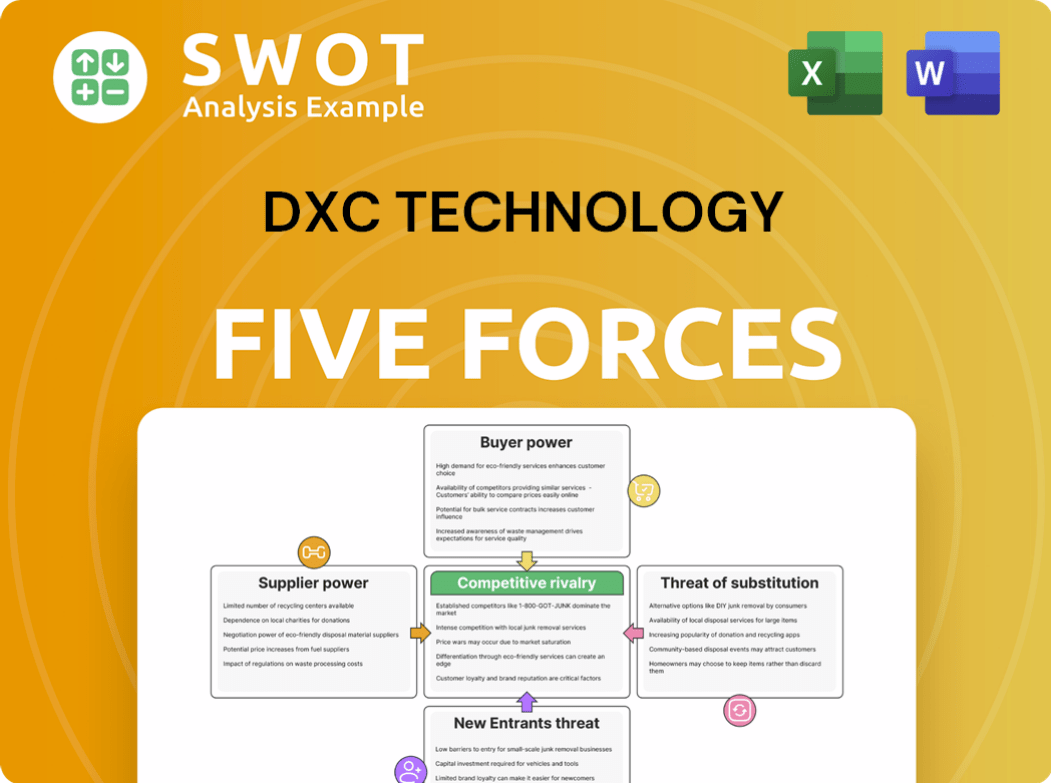DXC Technology Bundle
Navigating the Tech Titans: Who's Challenging DXC Technology?
In the fast-paced world of IT services, understanding the DXC Technology SWOT Analysis and its competitive landscape is crucial for any investor or strategist. DXC Technology, a major player in the industry, helps businesses with digital transformation. But who are its main rivals, and how does DXC Technology stack up in this dynamic market?

This analysis delves into the DXC Technology competitive landscape, offering a detailed market analysis of its rivals and their strategies. We'll explore DXC competitors like Accenture, IBM, and TCS, examining their strengths, weaknesses, and how they impact DXC Technology's industry position. By understanding DXC Technology's competitive advantages and DXC Technology market share analysis, you'll gain valuable insights into the IT services sector and its future.
Where Does DXC Technology’ Stand in the Current Market?
DXC Technology, a major player in the IT services sector, holds a significant market position. The company, with a global presence spanning over 70 countries, provides a wide array of services including consulting, cloud solutions, and cybersecurity. Its operations are geared towards assisting clients in modernizing their IT infrastructure and ensuring security across various cloud environments.
The company's core operations are centered around two main divisions: Global Business Services (GBS) and Global Infrastructure Services (GIS). These divisions cater to a diverse clientele, including large enterprises and public sector organizations. DXC's value proposition focuses on delivering mission-critical services to its clients.
In fiscal year 2024, DXC Technology's total revenue was $13.67 billion. The GBS division contributed $6.82 billion, while GIS generated $6.8 billion. Despite a slight decrease in overall revenue, the company's focus on profitability is evident. DXC reported a net income of $86 million for the same period, and its free cash flow increased to $756 million.
DXC Technology offers a comprehensive suite of IT services. These include consulting, cloud services, cybersecurity, and data analytics. The company aims to help clients modernize their IT, optimize data architectures, and ensure security across various cloud platforms.
In fiscal year 2024, DXC's total revenue was $13.67 billion. The company's net income was $86 million, and free cash flow reached $756 million. The Insurance Software and BPO division showed growth, with revenue increasing to $1.54 billion.
DXC Technology operates in over 70 countries worldwide. This extensive global footprint allows the company to serve a diverse range of clients. The wide geographic reach supports its ability to deliver IT services on a large scale.
The company serves large enterprises and public sector organizations. DXC provides mission-critical services to these segments. This focus allows DXC to build strong relationships with key clients.
The competitive landscape for DXC Technology includes major players in the IT services industry. Analyzing the DXC competitors reveals the challenges and opportunities the company faces. Understanding the DXC Technology market share analysis is crucial for assessing its position.
- DXC Technology's IT services offerings are broad, encompassing consulting, cloud, and cybersecurity.
- The company's financial performance, including revenue and free cash flow, is a key indicator.
- Geographic presence in over 70 countries supports its global reach.
- For more insights into the DXC Technology competitive advantages, you can explore the Marketing Strategy of DXC Technology.
DXC Technology SWOT Analysis
- Complete SWOT Breakdown
- Fully Customizable
- Editable in Excel & Word
- Professional Formatting
- Investor-Ready Format

Who Are the Main Competitors Challenging DXC Technology?
The competitive landscape for DXC Technology is dynamic, shaped by the presence of major IT services providers and emerging firms. This environment demands continuous innovation and cost-efficiency to maintain a strong market position. Understanding the DXC competitors and their strategies is crucial for assessing DXC Technology's position in the IT services market.
Market analysis reveals that competition is fierce, with companies constantly adapting to technological advancements and client demands. Industry trends, such as cloud computing, cybersecurity, and digital transformation, are key areas where these companies compete. DXC Technology and its rivals continually refine their offerings to meet evolving customer needs and gain a competitive edge.
DXC Technology faces competition from several key players in the IT services industry. These competitors often offer similar services, including cloud solutions, cybersecurity, and application modernization. The competitive dynamics are further influenced by mergers, acquisitions, and strategic partnerships.
Direct competitors include global IT service and consulting firms. These firms compete across various service lines such as cloud services, cybersecurity, and IT outsourcing.
Key competitors include Wipro, Tata Consultancy Services (TCS), NTT Data Group, IBM Deutschland, and International Business Machines (IBM).
Competitors challenge DXC Technology through price, innovation, and strategic partnerships. The industry requires continuous technological advancement and cost optimization.
Mergers and alliances significantly impact competitive dynamics. DXC Technology's formation from the merger of CSC and HPE's Enterprise Services is a prime example.
DXC Technology's recent restructuring initiatives aim to simplify operations and enhance efficiency, responding to competitive pressures.
New and emerging players, particularly those focused on niche digital transformation areas or leveraging advanced AI capabilities, can disrupt the traditional landscape.
The competition within the IT services sector is intense, with companies constantly striving for market share. For example, DXC Technology and IBM are both major players, offering a wide array of services. To gain a deeper understanding, consider exploring the Growth Strategy of DXC Technology. This competitive environment necessitates that DXC Technology continually adapt and innovate to maintain its position. The company's ability to respond to these challenges will be crucial for its future success.
DXC Technology's competitive advantages include its global presence and diverse service offerings. However, challenges include intense competition and the need for continuous innovation.
- DXC Technology competes with IBM, TCS, and Wipro, among others.
- The company's strengths lie in its scale and broad service portfolio.
- DXC Technology's weaknesses may include the complexity of integrating acquired businesses.
- The future outlook depends on its ability to adapt to market changes and customer needs.
DXC Technology PESTLE Analysis
- Covers All 6 PESTLE Categories
- No Research Needed – Save Hours of Work
- Built by Experts, Trusted by Consultants
- Instant Download, Ready to Use
- 100% Editable, Fully Customizable

What Gives DXC Technology a Competitive Edge Over Its Rivals?
Understanding the DXC Technology competitive landscape is crucial for anyone analyzing the IT services market. DXC Technology, with its long history and diverse service offerings, has established a significant presence. This section delves into the key competitive advantages that DXC Technology leverages to maintain its position and compete effectively within the industry.
DXC Technology's competitive strategy focuses on delivering comprehensive solutions, emphasizing innovation, and building strong partnerships. Recent industry trends, such as the increasing demand for digital transformation and AI integration, have shaped DXC Technology's approach, allowing it to adapt and remain relevant. This analysis provides insights into how DXC Technology differentiates itself from its DXC competitors.
The DXC Technology market share analysis reveals a company that has consistently adapted to industry changes. By examining its strengths, we can better understand its ability to compete with major players like Accenture, IBM, and TCS. A deep dive into DXC Technology's competitive advantages reveals the core elements that drive its success.
DXC Technology benefits from over 45 years of experience in the IT services industry, stemming from its heritage with CSC and HPE Enterprise Services. This extensive history provides a deep understanding of complex IT environments. This experience allows them to provide services to large enterprises and government agencies, creating a strong foundation in the market.
DXC Technology offers a wide range of services, including cloud, cybersecurity, and data analytics. This comprehensive portfolio enables the company to provide end-to-end solutions. This helps clients modernize IT, optimize data architectures, and ensure security across various cloud environments.
DXC Technology invests heavily in research and development, promoting a culture of creativity. In 2024, the company reported a 30% increase in cross-functional project success rates. This demonstrates the effectiveness of its collaborative efforts, driving innovation and improving service delivery.
DXC Technology forms strategic partnerships to enhance its service offerings and expand its market reach. Collaborations, such as the one with Boomi for integration services, help deliver advanced solutions. These partnerships enable DXC Technology to provide more comprehensive services to its clients.
DXC Technology differentiates itself through its deep industry knowledge, comprehensive service offerings, and focus on innovation. The company's 'AI First' policy, integrating AI across various offerings, positions it well for future growth. DXC Technology's commitment to ethical conduct and a people-first work environment, as recognized by Newsweek, contributes to its brand equity and ability to attract top talent.
- Leader in Digital Workplace Services: Recognized as a Leader in the 2024 Gartner Magic Quadrant for Outsourced Digital Workplace Services, highlighting its capabilities in Modern Device Management and Intelligent Collaboration.
- AI Integration: Focus on 'AI First' policy across applications, insurance software, and other key areas.
- Strong Partnerships: Strategic collaborations with companies like Boomi and Alpega Group enhance service delivery and market reach.
- Employee Recognition: Named one of America's Greatest Workplaces for 2024 by Newsweek, supporting talent attraction and retention.
DXC Technology Business Model Canvas
- Complete 9-Block Business Model Canvas
- Effortlessly Communicate Your Business Strategy
- Investor-Ready BMC Format
- 100% Editable and Customizable
- Clear and Structured Layout

What Industry Trends Are Reshaping DXC Technology’s Competitive Landscape?
The IT services industry is undergoing significant transformation, driven by technological advancements and evolving client needs. Within this dynamic environment, understanding the DXC Technology competitive landscape is crucial for stakeholders. This analysis provides insights into DXC Technology's industry position, the risks it faces, and its future outlook.
DXC Technology operates in a competitive market, facing challenges and opportunities shaped by technological shifts and regulatory changes. The company's ability to adapt to industry trends, manage financial performance, and capitalize on growth areas will determine its future success. A thorough market analysis is essential to evaluate DXC Technology's strategic positioning and prospects.
The IT services industry is heavily influenced by rapid technological changes, regulatory landscapes, and shifting client demands. Artificial intelligence (AI) is a significant trend, with companies like DXC Technology integrating AI into their service offerings. Regulatory changes concerning data privacy and cybersecurity also shape the industry, requiring robust security solutions.
DXC Technology faces challenges including ongoing revenue declines and the need to rebuild investor trust. The company reported a 5.3% global revenue fall in fiscal year 2024, with a projected decline of 4% to 6% for fiscal year 2025. Restructuring plans and executive changes add to the hurdles.
Significant opportunities exist for DXC Technology in areas like digital solutions, cloud services, and cybersecurity. Strategic partnerships and a focus on enhancing operational excellence are key. The company anticipates a return to growth in the second half of fiscal year 2025.
DXC Technology is focusing on growth in digital solutions, cloud services, and cybersecurity, aiming to align its growth rate with competitors. Strategic partnerships, such as the one with Alpega Group, demonstrate a proactive approach. The company's commitment to STEM education and fostering a diverse workforce also plays a role.
DXC Technology navigates a dynamic IT services market with both challenges and opportunities. The company's focus on digital solutions, cloud services, and cybersecurity is crucial for future growth. Understanding the competitive landscape and strategic initiatives is essential for evaluating DXC Technology's prospects.
- Industry Trends: Rapid technological advancements, AI integration, and regulatory changes in data privacy and cybersecurity.
- Challenges: Revenue declines, restructuring costs, and the need to rebuild investor trust.
- Opportunities: Growth in digital solutions, cloud services, and cybersecurity; strategic partnerships.
- Strategic Initiatives: Focus on digital solutions, cloud, and cybersecurity; partnerships; commitment to STEM education.
DXC Technology Porter's Five Forces Analysis
- Covers All 5 Competitive Forces in Detail
- Structured for Consultants, Students, and Founders
- 100% Editable in Microsoft Word & Excel
- Instant Digital Download – Use Immediately
- Compatible with Mac & PC – Fully Unlocked

Related Blogs
- What are Mission Vision & Core Values of DXC Technology Company?
- What is Growth Strategy and Future Prospects of DXC Technology Company?
- How Does DXC Technology Company Work?
- What is Sales and Marketing Strategy of DXC Technology Company?
- What is Brief History of DXC Technology Company?
- Who Owns DXC Technology Company?
- What is Customer Demographics and Target Market of DXC Technology Company?
Disclaimer
All information, articles, and product details provided on this website are for general informational and educational purposes only. We do not claim any ownership over, nor do we intend to infringe upon, any trademarks, copyrights, logos, brand names, or other intellectual property mentioned or depicted on this site. Such intellectual property remains the property of its respective owners, and any references here are made solely for identification or informational purposes, without implying any affiliation, endorsement, or partnership.
We make no representations or warranties, express or implied, regarding the accuracy, completeness, or suitability of any content or products presented. Nothing on this website should be construed as legal, tax, investment, financial, medical, or other professional advice. In addition, no part of this site—including articles or product references—constitutes a solicitation, recommendation, endorsement, advertisement, or offer to buy or sell any securities, franchises, or other financial instruments, particularly in jurisdictions where such activity would be unlawful.
All content is of a general nature and may not address the specific circumstances of any individual or entity. It is not a substitute for professional advice or services. Any actions you take based on the information provided here are strictly at your own risk. You accept full responsibility for any decisions or outcomes arising from your use of this website and agree to release us from any liability in connection with your use of, or reliance upon, the content or products found herein.